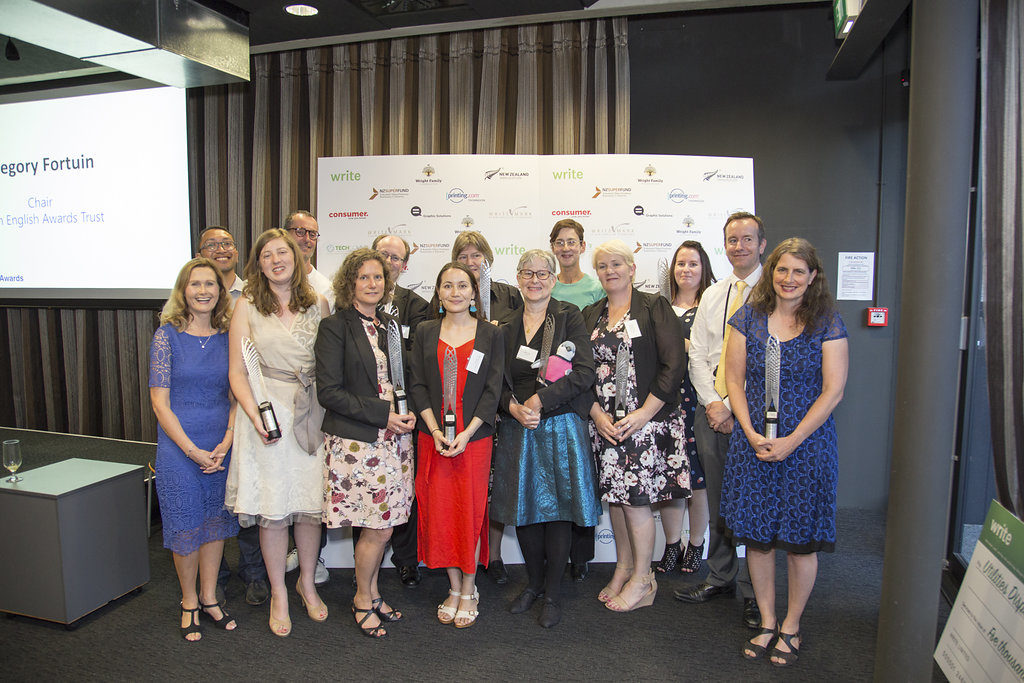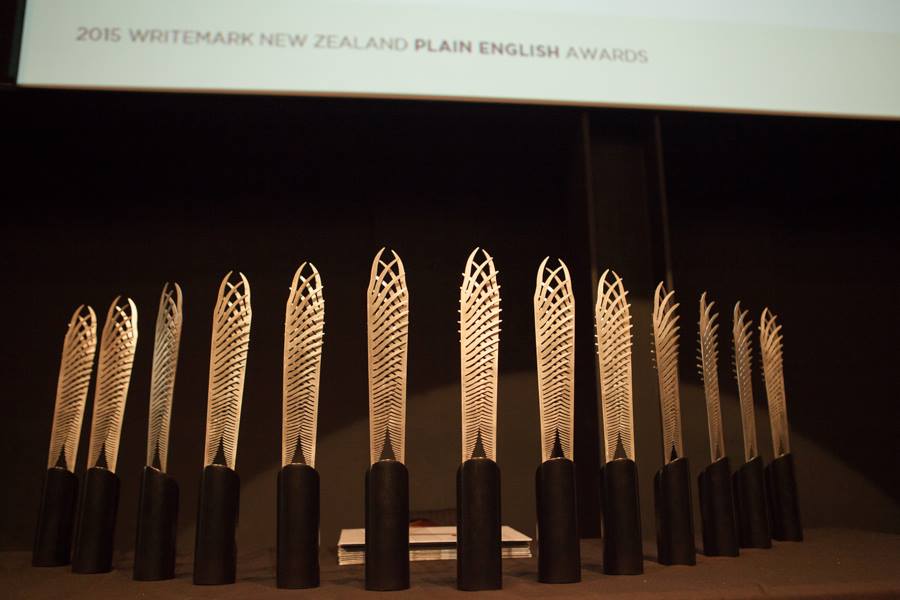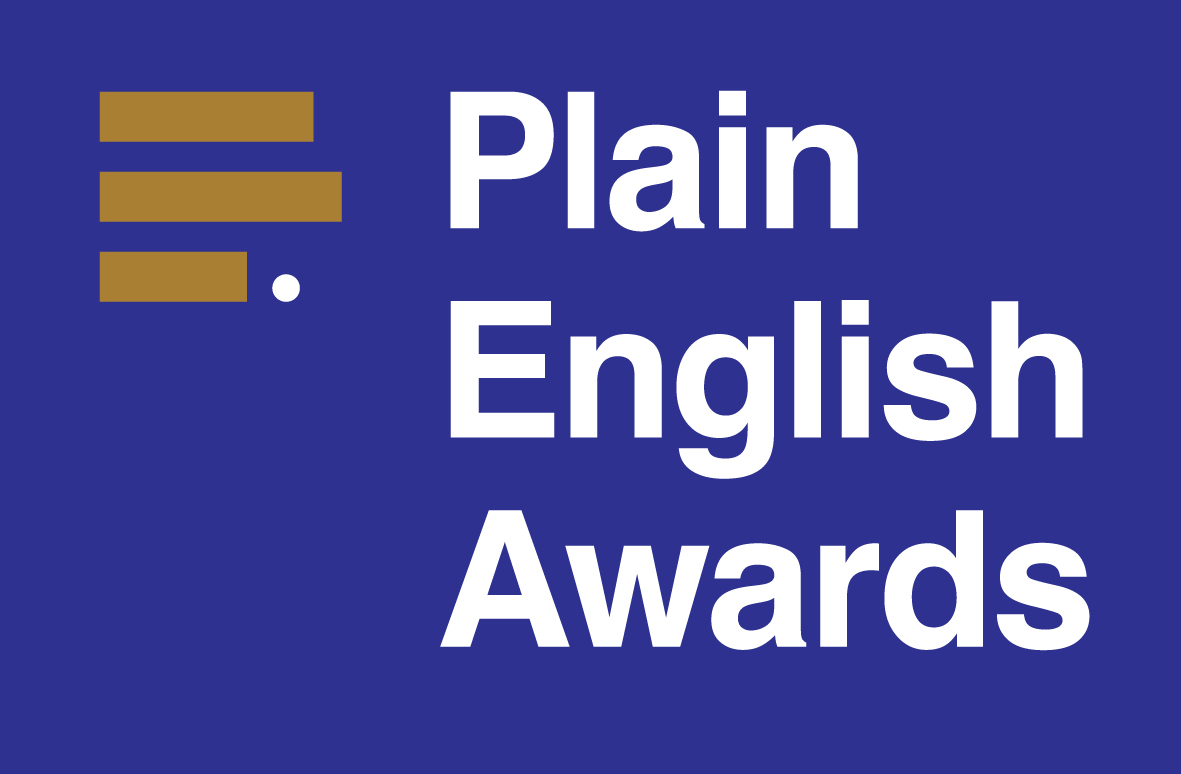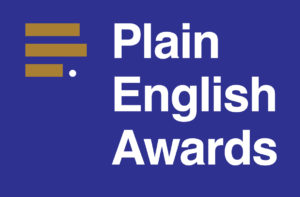
Winners of the 2017 Plain English Awards
Congratulations to all our winners and finalists!
Utilities Disputes was the big winner at the 2017 Plain English Awards held at the Royal Society Te Apārangi in Wellington last night. Jerome Chapman, Deputy Commissioner, received the Best Organisation supreme award on behalf of the not-for-profit company. The judges noted:
Utilities Disputes has deliberately embedded plain English into the core of its organisation culture. And its perseverance and commitment have obviously paid off. They are truly plain English champions, and deserve recognition for their expertise and commitment to plain English philosophy.
Utilities Disputes won services worth $5,000 from New Zealand’s plain English specialists and founding sponsor, Write Limited.
Another champion recognised
The other award in the Champion category went to Steph Prince from NZ Transport Agency for Best Individual or Team.
Praise for best documents and websites
The award for the Best Plain English Document for the private sector went to Tower Insurance Limited for their House Insurance Premium Cover. Superu took out the award for the public sector with Making Sense of Evaluation — a handbook for the social sector.
The Best Plain English Website award went to the Department of Internal Affairs for the govt.nz website. This informative yet accessible website has won before.
Re-thinking a document or website to improve it
The Best Plain English Turnaround award went to Ministry of Civil Defence & Emergency Management for its happens.nz website, replacing the Ministry’s getthru.govt.nz website.
Legal, Technical Communicator, and Annual Report categories
Parliamentary Counsel Office took out the Best Legal Document award for its Contract and Commercial Law Act 2017.
The Best Plain English Technical Communicator was Louisa Eades from Streamliners.
Z Energy won Best Plain English Annual Report for its 2017 report titled Solving what matters for a moving world. 2017 Annual Report.
Spotlight on the humble sentence
Jan Schrader at Stats NZ won the award for Best Sentence Transformation. Stats NZ has won in this category before, most recently in 2015.
People’s Choice — the best and the worst
Members of the public also submitted entries for two categories. The People’s Choice awards recognise the best and worst in government and corporate communications. Wellington City Council won the Best Communication award for its Our Wellington magazine. Of this entry the judges said:
What’s not to like? The document’s intention is clear and headings highlight the key messages. It has a vibrant design, clear statement headings, friendly language, and good variety. It successfully combines drier council initiatives with more exciting information on events. This good piece of work is probably well liked by Wellingtonians.
The People’s Choice Worst ‘Brainstrain’ award went to Inland Revenue. The Department received this could-do-better award for its direct debit conditions. The judges said, ‘This is supposedly an explanation of the conditions under which Inland Revenue has authority to accept direct debits — we think!’ The person who nominated the document said:
‘Inland Revenue say they have improved their website and made it easier to do business. But when you choose to pay by direct debit and two days later this nonsense is emailed to you — from a do not reply email so there is no way to ask for plain English — they could do better.’
Inland Revenue responded in good spirit with a humorous video.
The benefits keep coming after 12 years
After 12 years of Awards, we’re really starting to reap the benefits of business and government using clear communication to engage with their clients, consumers, and customers.
Chris Trudeau, US plain language specialist and professor of law, has said that New Zealand is ‘far ahead of the game’ in plain language. And this year, judges felt only one entry truly qualified as a ‘Brainstrain’. That’s got to be good news! And may this trend of constant improvement continue.
The 2017 Awards received entries from new entrants and previous award entrants. So it’s evident that those entrants recognise the benefits of New Zealanders receiving messages that are clear, concise, and consistent.
As Gregory Fortuin, chair of the WriteMark Plain English Awards Trust, explains, ‘Think of people caught in an emergency getting fast help from their insurer through an easy-to-complete claim form. Or patients experiencing less stress because they can easily understand their treatment. Or investors being able to understand their investment options from reading a clear investment statement. Communications written in plain English really can improve the lives of everyday Kiwis.’
Thanks to our 2017 sponsors
Major sponsors for this year’s Awards included WriteMark Limited, Write Limited, NZ Super Fund, Immigration New Zealand, printing.com, Wright Family Foundation, TechCommNZ, Graphic Solutions, and Consumer NZ.
Other sponsors, whose contributions to the Awards were also invaluable, were Kendons, Editor Software (United Kingdom), JUNO Investing Magazine, Community Comms Collective, Business NZ, Shelly Davies Writing & Training, Summer KiwiSaver Scheme, and Justly.
Nicola Welby November 24th, 2017
Posted In: Communications

From shortlists to finalists — decisions have been tough. Photo by Gaelle Marcel on Unsplash
After some tough deliberations from our judges, here are the finalists in the 2017 Plain English Awards.
As with our shortlists, entries are in no particular order. We haven’t published finalists in some categories so we don’t let the cat out of the bag.
‘Ooh — awesome’
Read some of the feedback we’ve had from judges about this year’s finalists below.
- ‘All three judges found this to be the very best group of entries we have seen in our many years judging these awards.’
- ‘We applaud the effort everyone has made to follow the principles of plain writing.’
- ‘You can be especially proud to win this category among these excellent entries!’
- ‘The friendly, light tone in this rewrite is a delight.’
- ‘When I finished the rewrite I said aloud “Ooh – awesome”.’
- ‘Overall this is an excellent effort.’
Winners will be announced on 23 November
We’ll announce our winners at the Awards ceremony in Wellington on 23 November. We’ll also publish the list of winners on our website later that evening.
Nicola Welby October 20th, 2017
Posted In: Awards brand, Communications, Finalists, Plain English Awards
Tags: clear communication, Finalists, Plain English Awards, plain language

The decisions were tough but our shortlists are out. Photo by Samuel Scrimshaw on Unsplash
We’ve had plenty of positive and productive feedback about this year’s entries, with several judges commenting on how tough their decision-making has been. One judge summed up the dilemma perfectly: ‘This competition is stiff, and we will have to do some real work to sort out the best of the best.’
Take a look at this year’s shortlists
Entries on the shortlists are in no particular order. If we haven’t published a shortlist, it means we can’t let the cat out of the bag just yet. In some categories we had fewer entries that met the judges’ high standard.
Look out for the list of finalists on 19 October.
Nicola Welby September 28th, 2017
Posted In: Communications, Plain English Awards
Tags: 2017 Shortlists, clear communication, People's Choice, Plain English Awards

One more day to submit entries! Photo by Chris Lawton on Unsplash
We’ve extended cut-off by one day
We’ve had a few enquiries from people confused about our cut-off date for entries. The confusion has been between the end of the month (yesterday) and the end of the week (today). So we’ve extended the cut-off until 6pm today. That’s right folks, you’ve got one whole extra day to get your entries in!
Nicola Welby September 1st, 2017
Posted In: Plain English Awards
Tags: Plain English Awards

Time to celebrate! Photo by Tessa Rampersad on Unsplash
Why do we hold the annual Plain English Awards? What is it exactly that we’re trying to achieve?
Celebrating individuals and organisations that put the needs of their readers first
Everyone’s talking about it — busy people leading busy lives. Everyday people are regularly expected to read what can be critical information in a variety of mediums. But if the information they’re getting is written or presented in a way that makes it difficult to process, essential messages can get lost or muddled.
The Plain English Awards celebrate individuals and organisations that put the needs of their readers first. The Awards aim to:
- improve government and business documents so that all New Zealanders can understand them
- raise public awareness of the need for, and benefits of, plain English
- create a public preference for organisations that choose to communicate in plain English.
How seemingly small changes can make a big difference
Last year Wellington author and writing trainer Simon Hertnon was a judge in the People’s Choice section of the Plain English Awards. He and his panel members chose the winner of the Best People’s Choice — Best Plain English Communication and the People’s Choice — Worst ‘Brainstrain’ Communication.
Simon shared his impression of the two winning entries in his recent blog post about the critical influence of tone in a formal document. Suitable tone is a key component of any plain English document. And last year’s winner of the Best Plain English Communication Award offered a perfect example of how effective good tone can be. The winner of the Brainstrain Award, however, illustrated the alternative.
‘One winning entry illustrated why the default writing style of business and government — which I would characterise as formal, exhaustive, and impersonal — regularly fails to meet the needs of today’s information-overloaded reader,’ Simon says in his blog post.
‘The other winning entry provided an exemplar for what business and government writers can and should do to improve the quality and usefulness of their writing. That is, to employ a familiar, confident, no-nonsense tone.’
Time to get your entries in for the 2017 Awards
Have you submitted your Awards entries yet? Don’t miss out — enter now
Nicola Welby August 30th, 2017
Posted In: Plain English Awards
Tags: Brainstrain, People's Choice, Plain English Awards, Simon Hertnon

Calling all champions — it's time to enter the Plain English Awards (Image by Nick Youngson (CC BY-SA 3.0))
You definitely don’t want to miss out! Now’s the time to enter the 2017 Plain English Awards. Because who wouldn’t want to be in the running at these prestigious awards?
There’s no need to be shy about entering. Are you worried your content might not be plain enough? That’s a very good sign, because it shows that you care enough to be concerned. You care enough to want to do the best for your reader. You care about clear communication. It shows that you’re a perfectionist — and perfectionists like you are the closet champions we’re looking for.
If you truly care, enter your own or somebody else’s content in this year’s Plain English Awards. The Awards honour those who write plain English.
10 facts about New Zealand’s Plain English Awards
- Entries close in 3 weeks, on 31 August 2017.
- Most people don’t think they are good enough to enter — so seize the advantage!
- No entry has ever been perfect — perfection is not possible.
- The judges are impressed by effort, and delighted by every clear document.
- The only documents publicly criticised are those in the Brainstrain Award.
- You can enter a document, a website — or just a single sentence.
- You can enter other people’s work in the People’s Choice category.
- The premier prize is worth $5,000.
- The Awards have been running for 12 years.
- The awards are a not-for-profit event hosted by the WriteMark Plain English Awards Trust.
Enter the Awards here
Melissa Mebus August 10th, 2017
Posted In: Communications
Tags: champions, plain English, Plain English Awards

Immigration New Zealand is supporting clear communications for new and not-so-new New Zealanders by sponsoring the Best Plain English Turnaround Award in 2017.
Immigration New Zealand (INZ) understands how important it is to use plain English. INZ helps migrants to get established in New Zealand. By providing newcomers with clear information and services, we can help them to successfully settle and contribute to our communities.
Immigration New Zealand is keen to encourage the use of plain English as a common practice in our country.
Judi Altinkaya, National Manager, Migrant Settlement explains:
With more than a quarter of New Zealand’s population born abroad, not everyone understands English well. It’s important for people whose jobs involve communications to keep this in mind.
For migrants new to New Zealand, the quality of information they receive as they settle into their new lives here can make all the difference. The more that New Zealand organisations deliver that information effectively, in plain English, the more we can facilitate a smoother settlement process for newcomers.
Immigration New Zealand is keeping it clear
In August 2016, INZ launched Keeping it Clear. This online resource is designed to help organisations present their information more clearly so that it is easily understood by the growing proportion of new migrants in New Zealand.
We think the aim of these resources and the aim of the Plain English Awards are a natural fit!
What’s the Turnaround Award all about?
The Best Plain English Turnaround Award recognises the best rewrite of a document or website that was originally difficult to understand but has been significantly improved by adopting a plain English approach.
The Best Plain English Turnaround Award is open to all forms of communication, whether online, in print, or video.
Entries close on 31 August, with the awards to be announced on at the Awards ceremony on 23 November at the Royal Society of New Zealand’s premises in Wellington.
Thanks, Immigration New Zealand
We couldn’t do it without you!
Anne-Marie Chisnall August 8th, 2017
Posted In: Plain English Awards
Tags: migrants, Plain English Awards, sponsors, Turnaround Award

The fabulous Awards trophies created by sculptor Campbell Maud
We talk to Lynda Harris, plain language advocate and the original inspiration behind the Plain English Awards. Lynda is Chief Executive at Write Limited, premier Awards sponsor. The Awards are organised by the WriteMark Plain English Awards Trust and are now in their twelfth year.
What types of organisations enter the Awards?
All types of organisations enter — large and small, public and private sector. Basically any New Zealand organisation that cares about the way they communicate is a good candidate! Government organisations tend to get behind the Awards really well, but the corporate sector is increasingly well represented too.
What kind of documents can you enter?
Virtually any kind of business document or webpage can be entered. And, it’s not just documents — people and organisations are honoured too.
See the Awards categories here

The fabulous Awards trophies created by sculptor Campbell Maud
You’d be hard pressed to find a plain legal document, wouldn’t you?
Actually, you’d be surprised! Many law firms, including top tier firms and smaller niche firms, are proactively marketing themselves with plain English as part of their brand. The Awards include a dedicated category for legal documents, so watch this space!
What about financial documents? Can they really be clear to the average person?
Many financial organisations — banks and insurance companies especially — enter the Awards with impressively clear documents. In fact, a major bank (ANZ) and several other financial organisations have done especially well in the general categories over the years. We also have a special category for annual reports.
The Awards have a strong focus on excellent communication, but don’t you also expose really bad writing?
Twelve of the thirteen awards honour positive effort and results. The thirteenth ‘trophy’ (really a stainless steel bin filled with sour lollies) goes to the winner of the dreaded ‘Brainstrain’ award. That award goes to the worst document or website nominated by a member of the public. For the unlucky organisation receiving that award, confusion wins!
The Brainstrain award has a very positive side though. Very often, being nominated for a Brainstrain award is a wake-up call for its owner. Many use the nomination as an opportunity to look hard at their communication style and make really positive changes.
The Brainstrain award, along with its counterpart ‘Best Communication’ award, is sponsored very appropriately by public watchdog Consumer NZ. Thanks to Consumer NZ’s support, you can dob in a bad document, or praise an easy-to-read one.
Read about the special People’s Choice categories here
Who’s behind the Awards?
The Awards are offered by the WriteMark Plain English Awards Trust, ably led by chair and well-known people’s advocate Gregory Fortuin. Premier sponsor Write Limited does the administration on behalf of the Trust.
Other valued sponsors provide much appreciated financial and in-kind support.
Do you think the Awards are making a difference?
Absolutely! The process leading to success in the Awards transforms some organisations and individuals into zealous advocates for plain English. We’re due to do another feedback survey early next year, but previous surveys have given us overwhelmingly positive comments from entrants and others. Here are a few of those comments:
The Awards are the premier benchmark for high standards and achievement in plain English. Success in the Awards shows we’re not only doing it [plain English], but doing it well and our expertise is being recognised.
Winning the award has raised the bar.
We were shocked by being a finalist for the Brainstrain Award. That spurred a huge project. I personally did lots of research on plain English and came up with our own web writing standards that exceed the e-government guidelines.
The Awards also act as a public watchdog, highlighting examples of poor writing that are barriers to good communication and people achieving what they want to do.

Who’s the clearest of them all?
Anne-Marie Chisnall July 10th, 2017
Posted In: Communications
Government agencies and commercial firms are again vying for honours in the annual Plain English Awards. Organisations are turning their back on corporate jargon, bureaucratic writing, and legalese.
Now in their 12th year, the Awards have an impressive track record. They encourage New Zealand organisations to favour clarity over complexity and celebrate those who choose to be clear.
The Awards are the premier benchmark for high standards and achievement in plain English. Success in the Awards shows we’re not only doing it [plain English], but doing it well and our expertise is being recognised.
Entries are open until August
Entries are open across nine categories. Awards are available for everything from superb sentence rewrites and document transformations, to recognition for people who campaign for clarity and their projects.
Entries are open now and will close on 31 August 2017.
Choose your category and enter the Awards
Anne-Marie Chisnall June 26th, 2017
Posted In: Communications
Tags: benchmark, clarity, legalese, Plain English Awards

Plain English Awards
Have you heard about the People’s Choice — Worst ‘Brainstrain’ Communication award? It’s the sibling of the People’s Choice — Best Communication award. Here are three things you need to know.
1. The Brainstrain award is the one award that organisations don’t really want to win. It reveals, in good humour, the document or website most notable for confusing and dumbfounding its target audience with obscurity and gobbledygook.
2. The ideal entry is a publicly available or widely used document or website that causes problems for many people.
3. By putting these confusing documents and web pages under the spotlight, we hope that the organisations responsible will rewrite them in beautifully plain English. And we’ve had some great turnaround stories prompted by this publicity.
So why not nominate a great or not-so-great document or website for one of the People’s Choice Awards.
Get involved with the People’s Choice Awards

Plain English Awards
Nicola Welby June 16th, 2017
Posted In: Communications
Tags: Brainstrain, consumers, gobbledygook, plain language, transformation













